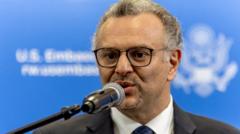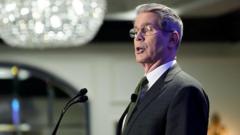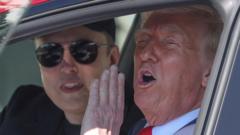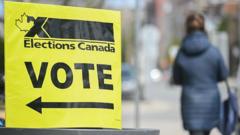Musk's commitment to Tesla and political responsibilities are under scrutiny as he faces increasing protests and a noticeable decline in company sales.
Musk to Scale Back Role in Government Amidst Tesla Revenue Decline

Musk to Scale Back Role in Government Amidst Tesla Revenue Decline
Elon Musk announces a significant reduction in his role with the Department for Government Efficiency (Doge) following major profit losses reported by Tesla.
Tesla CEO Elon Musk has recently declared plans to "significantly" reduce his involvement with the Department for Government Efficiency (Doge) following alarming reports of declining profits and car sales at Tesla. This announcement comes in light of an overwhelming 20% drop in car sales during the first quarter of the year, compared to the same period last year, and a staggering 70% plunge in profits.
Since its inception, Musk has led the advisory body Doge, which was created to streamline governmental efficiency and reduce waste. However, amid accusations that his government role has detracted from his focus on Tesla, Musk confirmed that starting next month he would only dedicate one to two days a week to Doge, suggesting a renewed concentration on Tesla's operational needs.
The backlash against Musk’s political involvement has resulted in global protests and boycotts of Tesla vehicles. This political engagement has become contentious, particularly in the context of temporary government employment, which generally limits such workers to 130 days annually. Reports indicate that Musk, who invested significantly in Donald Trump’s re-election campaign, may maintain some involvement as long as requested by the president.
In the wake of weak sales and profit reports, Musk emphasized his intent to return more fully to Tesla, while also recognizing the critical nature of his government work and his commitment as long as it remains beneficial. Despite Musk’s claims, the financial outlook for Tesla remains dim, with the company not providing a growth forecast due to "changing political sentiment" affecting demand.
Tesla's share prices have faced challenges, with a nearly 37% drop in value this year before briefly recovering by 5% in post-market trading after the financial results were released. The company's vulnerability has been accentuated by Trump’s tariffs on Chinese imports, which pose a risk to Tesla's supply chains reliant on foreign components, despite structural efforts to localize production.
Compounding matters, Musk has engaged in disputes over trade policies with members of the Trump administration, notably trade adviser Peter Navarro. Following Navarro's critical remarks regarding Tesla’s manufacturing model, Musk expressed strong dissent, reiterating his aim to advocate for more favorable tariff conditions.
Industry analysts have voiced concerns regarding Tesla’s mounting challenges, with expectations of minimal recovery tempered by fierce competition and unpredictable trade landscapes. The firm’s future viability may hinge on a refocused leadership strategy and a robust response to ongoing operational adversities.























